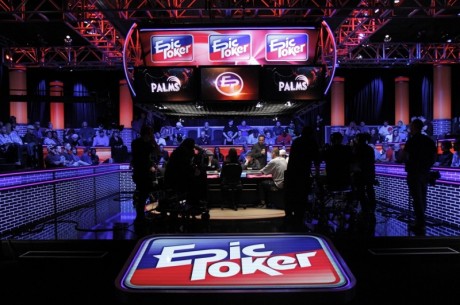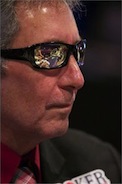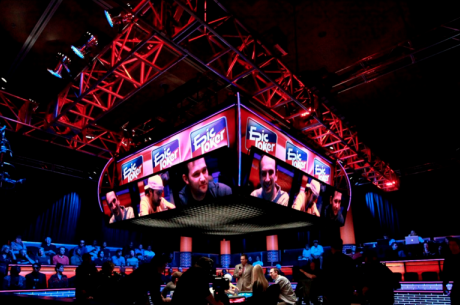December 25 2011, Eric Ramsey


Jeffrey Pollack
In 2009, the exit of the Commissioner of the World Series of Poker put Jeffrey Pollack on our list as the fifth biggest headline maker of the year. Soon thereafter, he took on the role of executive chairman for Professional Bull Riders (PBR), but it seemed a relative certainty that we’d seem him return to the felt in good time.
Two years after his departure from the game, Pollack finds himself back on our list and surrounded by a cast that contains a few familiar characters from the poker’s elite. During the course of 2010, Pollack was busy cofounding Federated Sports + Gaming with a big focus on poker. According to its website, FS+G strives “to develop, establish and grow proprietary world-class sports and gaming brands through the thoughtful integration of traditional and digital media.”
To be honest, that mission statement didn’t exactly set us astir, but reading on raised our eyebrows a bit. “Our first initiative launches in the first half 2011,” FS+G announced, “with the premiere of a revolutionary professional poker league and online gaming experience that breaks new ground and provides a superior live tournament and television experience.” The “online gaming experience” has since been partially derailed by Black Friday, but the other half of the initiative was still a go.
In January 2011, FS+G announced that it had partnered with Palms Casino Resort to form its new poker league and give it a permanent home. Then in February, FS+G made its plans for live poker official by releasing a schedule of events for the first season of the still-nameless series.
Annie Duke was added as the commissioner and Matt Savage as tournament director, and a couple of months later, the tour was slapped with the moniker Epic Poker League. Major television deals with CBS and the Velocity Network brought the vision to the masses.
Season 1 is comprised of four events held monthly at the Palms, and a Championship Event will close things out on Valentine’s Day 2012. As far as format goes, the decision makers exercised both restraint and innovation by scheduling a tidy, three-event set that includes a Pro/Am Event, a Charity Event, and the League Main Event during a two-week stretch.
The Pro/Am carries a modest $1,500 buy-in, and the final nine players all earn entries into the $20,000 Main Event. Those main events are to be dealt in four disciplines of no-limit hold’em: six-max, eight-max, mix-max, and shot clock. EPL also added $400,000 to the prize pools for each of those Main Events, but they weren’t done giving money away just yet. The top 27 money earners from the first four events will be entered into the $1 million freeroll League Championship Event.
The new Epic Poker League is not for everyone, though. In fact, only a small group of players were invited to the first season by being awarded one of three levels of membership cards. Admittance to the club is based on a combination of a player’s lifetime earnings, major poker titles, and recent success on the felt. Rankings for the players were based on a proprietary system dubbed the Global Poker Index (GPI), and 218 players were given cards in the initial round of recruiting. Those on the bubble scurried to rack up the requisite results to qualify over the summer, and the list has since grown to 252 active cards – though two of them have been suspended indefinitely.
Wait, what?
There’s plenty to talk about with the EPL, and its Standards and Conducts Committee generated good discourse within the poker community. To ensure the integrity of the league, the EPL formed a ten-member committee and charged it with “ensuring fair play, good character, and integrity in every aspect of the league’s operations.”
What’s more, they were entrusted with disciplinary powers including the authority to revoke a player’s tournament card in extreme cases. The EPL can’t escape the notion that poker and ethics are an inherently bad mix, but having well-respected players like Joe Hachem, Chad Brown, and Mike McDonald on the staff does add instant credibility.
The committee’s first official action came in August when Chino Rheem was placed on probation for personal matters regarding the repayment of debts. A month later, the league took the second most severe action it could have taken when it indefinitely suspended the cards of Howard Lederer and Chris Ferguson. In the meantime, a third disciplinary issue raised the eyebrows of many both inside and outside of the game.

Michael DiVita
Michael DiVita, a middle-aged amateur from California, finished in eighth place at the second Pro/Am event, earning a $20,000 seat in the Main Event. During the information gathering, though, it was learned that DiVita was a convicted sex offender, and the committee was called upon once again. Although they never took a formal action, DiVita forfeited his entry ticket and took to the poker forums and media to share his side of the story. The reactions to the way the EPL handled the situation were divided, but if any publicity is good publicity, then the league got its fair share thanks to Michael DiVita.
The inaugural EPL Main Event kicked off on Aug. 19, and the opener did not disappoint. Four days later, Chino Rheem escaped a brutally talented final table to claim the first championship ring and the $1 million top prize. A month later, the second Main Event title went to Mike McDonald, and Chris Klodnicki won the third Champion’s Ring earlier in December. There’s still one more Main Event plus the Championship Event freeroll to get to before the books are closed on Season 1.
Criticism has been widespread, but it’s still too early to tell whether the Epic Poker League has been (or will be a) a success. It’s noteworthy, though, that the vast majority of the complaints have come from those on the outside, and their opinions should be taken with the proverbial grain of salt.
From those on the inside, the remarks are almost universally favorable. And what’s not to love? EPL hand picks the best dealers in the business, provides food vouchers for the players and media, and adds money to the prize pool, while taking no rake. The EPL’s tag line, “For the players,” seems to be guiding it in the right direction.
McLean Karr referred to the league as “a nice reward for having success in other live events,” and Matt Glantz called the team “top-rate from top to bottom.” Glantz went on to highlight some of the refreshing and unique elements and EPL event presents. “There is rarely any unnecessary tanking and not much sunglass-wearing. Most refreshing, though, is the strong aura of mutual respect between all of the players.”
Long before he was slipping the Champion’s Ring on his finger, Klodnicki was another of the supporters. “The overall vibe from the players the players was great,” he said in August. “It was definitely a tougher field than most of the tournaments I play in, but the added money and no rake helps compensate for that.”
Even the curmudgeonly Allen Bari brought himself to compliment the league. “There is just a more peaceful feeling at the table because there is a mutual respect for everyone,” he told us.
Whether or not it’s here to stay remains to be seen, but the Epic Poker League certainly made a splash in 2011.
Follow PokerNews on Twitter for up-to-the-minute news.
Photo courtesy of Epic Poker.
Follow Eric Ramsey on Twitter – @Eric_Ramsey
August 16 2011, Rich Ryan, Eric Ramsey

This past week, the Epic Poker League kicked off its inaugural season at The Palms in Las Vegas. Chino Rheem won the Main Event, defeating Erik Seidel heads up for $1 million. Those in attendance raved about how smoothly the tournament was run and how well the players were treated, but there are still naysayers like Daniel Negreanu who openly boycotted the event, that won’t play EPL events, even though they’re cardholders. We asked our own Eric Ramsey and Rich Ryan to discuss the topic, and examine whether or not the EPL will be successful.
Eric Ramsey: Of course the Epic Poker League will be successful
Let’s start with the decision makers, because a poker tour is only as good as the people who run it. Executive chairman Jeffrey Pollack played a major role in the poker boom, guiding the World Series of Poker through its biggest growth spurt. Pollack bowed out of the way after the wheels were set in full motion, and the WSOP brand has gone on to become a multi-million-dollar, global phenomenon with an enormous marketing presence. Filling the role of commissioner for the league is Annie Duke — a bracelet winner, an active proponent of legalizing poker, and one of the most well-spoken and well-respected minds in the game. On the floor, Tournament director Matt Savage runs a handful of the most successful tournaments in the world, and he has the poker world hanging by his every tweet. Savage is on the Tournament Directors’ Association Board of Directors, and his name on the EPL docket adds instant credibility with the players.
And then there’s television. Network television, to boot. The entire country will get to see the Season One events on CBS, a production that will be overseen by another top-notch entity in this arrangement, 441 Productions. Pollack and 441 have a history of producing some of the most watched, most famous moments in the history of the game, and the Epic Poker canvas figures to be a fine reunion masterpiece. Locking down a big network deal means a certain level of success has already been achieved, in my estimation.
Since the beginning, Pollack and Duke have professed that the league would be about the players themselves, and having an exclusive, invitation-only club makes that vision feasible. Throughout the inaugural event, Twitter and the tournament floor were abuzz with praises raining in from every angle. In fairness, it’s pretty easy to make fans when you wave the rake, add $400,000 to the prize pool, and hand out lots of swag on the way in the door. But the continued commitment to the player first (rather than the viewer) is a refreshing break from the norm in televised poker, and it’s one that seems to please some of the best players in the world.
Before the EPL came around, it would have been hard to find a vacant spot on the tournament block for a new tour to start laying a foundation. With a unique vision and a true focus on the players, though, this EPL already has the earmarks of something that’s here to stay. By all accounts, the league’s events are five-star all the way around, and the opening event had plenty of juicy story lines to keep the players and the fans coming back for more. The EPL has succeeded in bringing together an elite group of poker players for a unique and well-run event, and it’s definitely a broadcast I don’t plan on missing.
Rich Ryan: The EPL is awesome, yet unsustainable. It won’t be “successful”
In 1993, the Wu-Tang Clan taught us a very valuable lesson: “Cash rules everything around me, C.R.E.A.M. get the money, dollar dollar bill y’all.”
The first EPL Main Event was, dare I say it, nah, I won’t. The field was stacked, the final table was incredible, there was a seven-figure payday, and the buzz that was created was tremendous. The only people happier than poker fans were the players and the media in attendance. Duke and Pollack pampered their customers, offering them free rooms, supplying $100 food vouchers for each day of the tournament, and, of course, adding $400,000 to the prize pool. This all sounds fantastic, but where is the money coming from? And once that money dries up, where is the next batch going to come from?
While Neagreanu’s latest blog is very biased (he is anti-Duke), he brings up a lot of valid points. The most important point is that if the World Series of Poker struggles to pull in major sponsorships, and they’re syndicated on ESPN, running hundreds of hours of programming a year, then how is a tour with just seven hours on CBS going to find enough sponsorship money to keep them afloat? Sasquatch isn’t going to be willing to shell out enough money to cover the $400,000 being added to each tournament, and no other major companies are lining up to attach their brand to poker after Black Friday.
Additionally, playing in a $20,000 tournament with some of the best players in the world is terrible game selection. Obviously American players are limited because online poker is basically non-existent, but that doesn’t make lighting two stacks of high society on fire a good idea. Cardholders who are bankroll nits, or who realize that, without online poker, television time means nothing, are going to skip EPL events without a second thought. This depreciates the value of the card, shrinks field sizes, and can ultimately lead to the demise of the EPL as a whole.
For the time being, professional poker players (I’m looking at you, Mr. Negreanu) should enjoy the EPL. It’s truly the only tour in the world that is designed solely for the players, and, even thought it’s unsustainable, it’s great for the game. In a perfect world, there would be millions of dollars in revenue readily available and the EPL would be able to showcase the best players in the world. Unfortunately, that world ceased to exist around 2008, and now the poker economy is a shell of what it once was. The EPL’s spending will eventually catch up with them, and sadly make the tour unsuccessful.
What are your thoughts? Let us know in the comments section below, and as always, follow us on Twitter.
*Photo courtesy of EpicPoker.com




